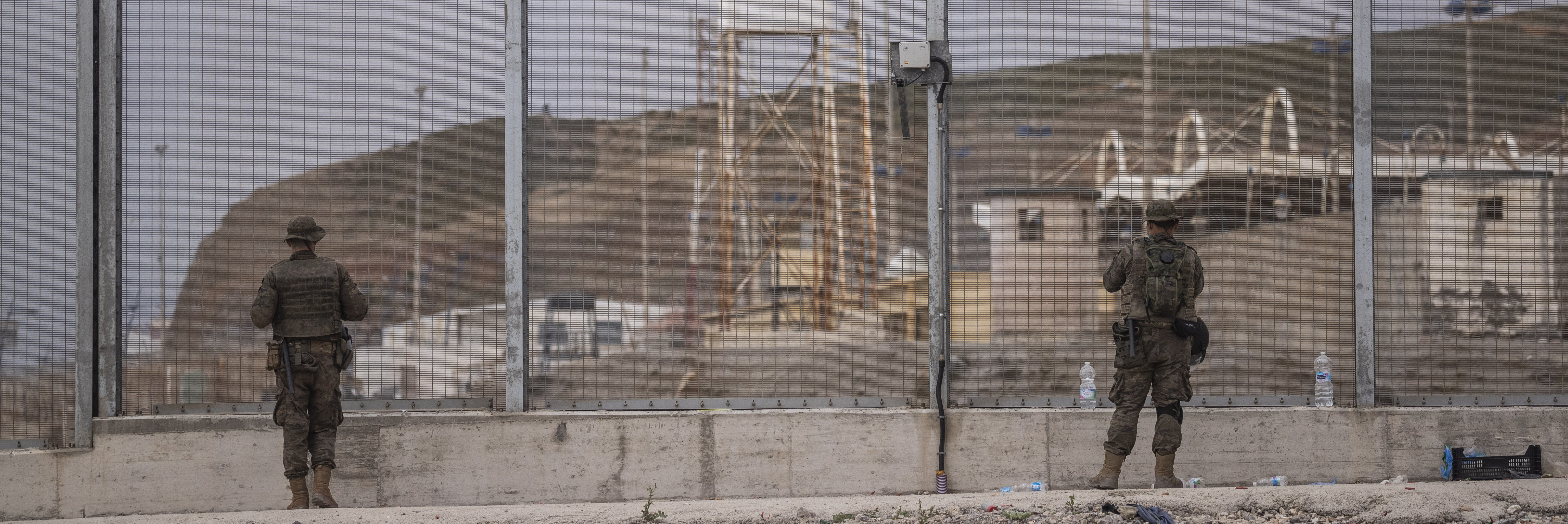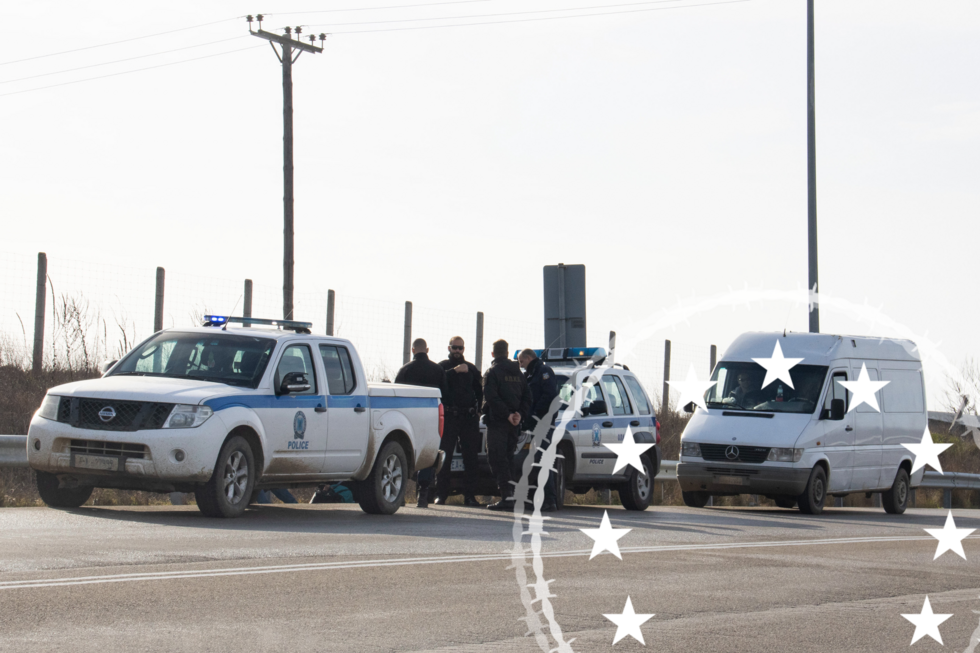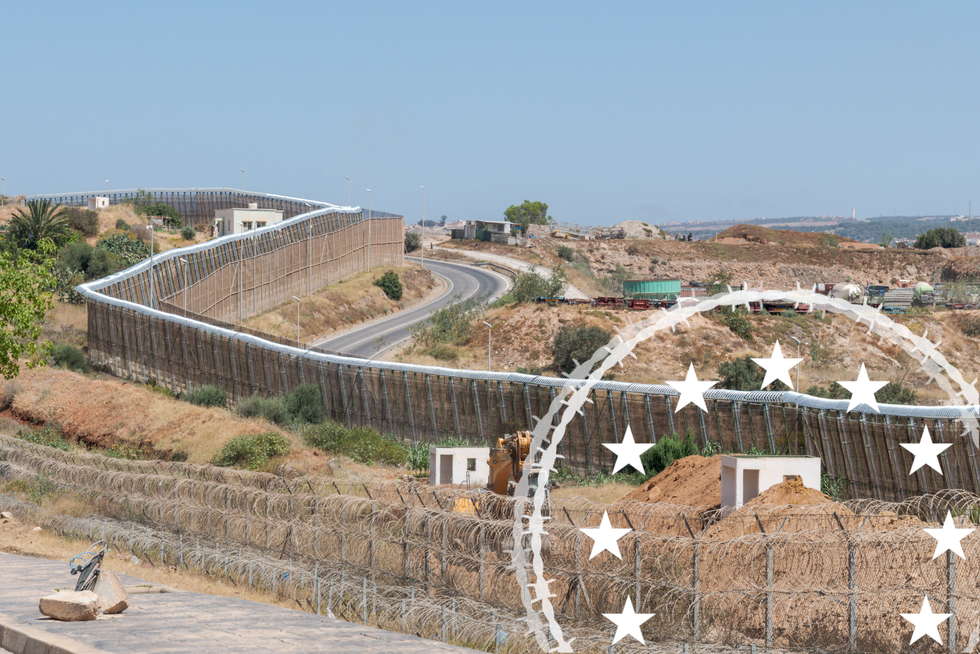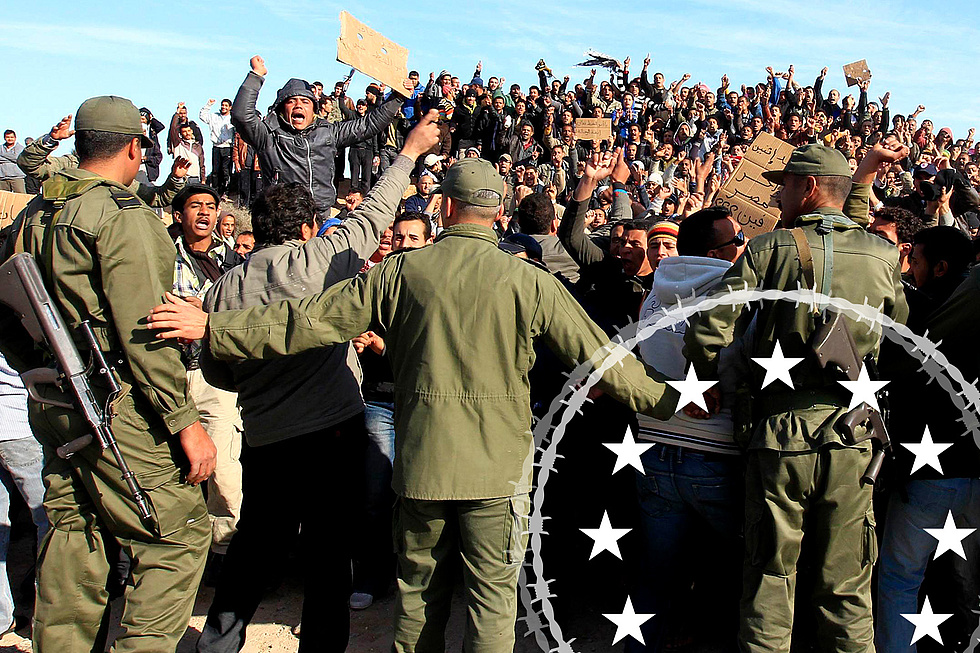The Transformation of Europe Behind Closed Borders: A Conversation

How border walls and violence impact the societies that construct these boundaries is the question political scientist Volker M. Heins and historian Frank Wolff address in their book Behind Walls: Closed Borders Endangering Open Society (Hinter Mauern: Geschlossene Grenzen als Gefahr für die offene Gesellschaft, Suhrkamp 2023, in German). As well as describing the often-criticised drastic effects of the new border regimes on migrants, they show how using undemocratic borders endangers democracy itself.
The main point being made in the book, as we see it, is that the closed-door policies, the walls and the fences we erect to ‘defend’ (to use a martial term) against migrants irrefutably has an adverse effect on our own democratic societies, which then become accustomed to violence and are willing to accept human rights violations carried out under the pretext of deterring would-be migrants from entering the country.
The fact that you perceive the use of the term ‘defence’ to describe border walls as martial is really quite apt. They do indeed serve a martial purpose. They are not erected to facilitate dialogue, to shape something dynamically or negotiate it democratically. Rather, they are meant to instil fear and exercise power unilaterally. Or at least this is the impression they seek to give – and yet conceal at the same time. And this brings us to the crux of the problem. The new borders are made of barbed wire, steel or water, and, considering the increasingly tight immigration laws, one might also say, they are made of paper. In any case they are created with the aim of curbing what is referred to as ‘illegal immigration’. But this term is a euphemism because what is really meant is stopping people from exercising their right to asylum.
The new walls actually prevent us from determining whether the person who is crossing the border is entitled to protection or not – in other words, whether their passage was legitimate and absolutely necessary from a human rights perspective. According to figures published by the International Organization for Migration (IOM), which are likely to be on the conservative side, since 2014, around 30,000 people have died on Europe’s southern border alone, before these facts could even be established. This isn’t a natural disaster. This is something the EU and its member states have created. So, it’s not about pushing back something illegal. It’s about violent defence against the physical arrival of unwanted people.
We are seeing this happen in an increasingly militarised form, which is why many observers describe the EU’s external borders as ‘lawless zones’, although this is not quite accurate either. On the contrary, a great deal of new legislation is currently being introduced to safeguard this practice, which, however, undermines fundamental legal ideas of democratic statehood. One of the main conclusions of our book is that the much invoked European values and democratic rule of law that these walls purportedly protect are being undermined. This is being done via numerous ad hoc measures and regulatory changes, such as the new reform of the Common European Asylum System (CEAS). Even migration scholars like Ruud Koopmans, whose left-liberal thinking is rather unsuspecting, posits that this far-reaching change in the law will have little impact on migration. But it will cause suffering and lead to the creation of zones that are outside state control – as well as incurring massive costs.
To legitimise such drastic measures and change in the law with all the consequences this requires what we describe as huge symbolic effort – and this is another conclusion drawn in our book. What we mean here is a tangible, long-term shift in the discourse which takes what can be thought and said about refugees and migration out of the context of the duty to protect, human rights, and transparent control of a security apparatus that is managed by the democratic process and places it in an entirely different context instead, namely that of threat to statehood, loss of control, and the imperativeness of state-sanctioned border violence. This discourse on borders further advances the social brutalisation of the centre of society that social scientists are repeatedly pointing out. It does this by using power to normalise anti-democratic ways of thinking as well as the ideas of the far-right, capitalising on the tangle of feelings associated with borders – a need for security, fear of foreigners and the hope for ‘solutions’. If the activists in Schnellroda and the like are to be believed, a plan is unfolding.
On page 15 of your book you allude to a rather thought-provoking context, saying: ‘Walls represent a fantasy of total security in a neoliberal world of diminishing state sovereignty where the lives of the majority are becoming ever-more precarious.’ Could you explain this context?
In her book about walls, philosopher Wendy Brown argues that in this era of waning sovereignty – in other words increasing democratic and legal curtailment of state power – these walls serve as a substitute, taking on a symbolic function, where ‘old’-style sovereignty can be visibly practiced. We took Brown’s argument and turned it inside out. The conclusion we came to is that building walls is not just about exercising sovereignty towards the outside world but also leaves it mark on the states constructing those walls.
In other words, the new border walls face in two directions. First, they make it possible to establish zones of systematised violence against unwanted arrivals – and here we are by no means talking about abstract forms of violence, but rather very real violence: dog bites, broken bones, people freezing to death or being left to drown.
And second, these walls are aimed at the populations of the states that built them; they represent a state that is freeing itself of the troublesome shackles of democracy. It is not that sovereignty has diminished per se. It has changed by states relinquishing some of their power in sovereign decision-making, particularly in the process of European integration, in order to secure peace and sovereignty together, rather than in conflict with one another. Consequently, statehood, especially in Europe, has become increasingly complex, designed according to the ideals of control of power and accountability, transparency, rule of law and internationalisation.
Walls stand for a trend in the opposite direction. Unwittingly following a right-wing script, borders are increasingly separated from democracy, staged in front of it, and formed according to an oversimplified concept of sovereignty which corresponds more to the Schmittian dogma of decision-making power over the state of emergency. As described by political scientist Nicholas de Genova, the ‘border spectacle’ is increasingly being used to portray borders as zones of a permanent state of emergency, both allowing and concealing changes to the law within the state itself.
This is why we refer to borders as extending inwards – whether as institutions of agreement, as the European internal borders were designed to be, or as representing authoritarian hopes, like the new walls. Although the latter stand for a deceptive sovereignty, they represent it visibly in one place, whereas democratic and constitutional sovereignty is spread over many places. The problem is that this is exactly what a considerable share of the population wants. This is something we mustn’t forget; a not insignificant proportion of European electorates vote against liberal democracy and want more room for power and hatred. And it is within the increasingly brutalised discourse on migration and borders that these positions are being normalised.
The following is an illustration of the shift associated with this development. While a few years ago CSU politician and ex-minister Alexander Dobrindt’s term ‘anti-deportation industry’ (anti-Abschiebe-Industrie), which he described as being used by lawyers and human rights activists to ‘deliberately sabotage the enforcement of the rule of law’, was voted the ‘Non-Word of the Year’, the new European asylum laws ultimately follow precisely this stigma. These laws are based on refugee camps whose residents, despite not being described as prisoners, face a lived reality that is tantamount to precisely that. In recent years, the residents of these refugee camps have been deprived of their access to legal representation and care, and at the same time, the press, NGOs and researchers are denied access to the camps, too.
This disenfranchises not only migrants but also lawyers, welfare workers and the research community. We have heard many reports from people living in the border regions of Poland who no longer know whether they are breaking the law or not if they stop their cars to pick up a person who is freezing to death on the roadside. And all this in the name of making the borders more effective. Migration and border researchers are however unanimous: the violence is real, the costs are high, the control effect is at best temporary.
So far, this has failed to make us reconsider whether we have taken a fundamentally wrong path in using violence and defence as a means of securing our borders. On the contrary, what we are seeing is a constant increase in attempts to secure borders in this way. On the one hand, this indicates a tremendous lack of vision. On the other hand, we describe this in our book as the ‘successful failure’ of border walls. They don’t achieve the designated objective and for this very reason are increasingly becoming a space of representation for (supra-)state sovereignty. The result is an EU that is relying more and more on actors that are largely outside the control of the parliament and the press, as in the case of Frontex and third countries.
To come back to the question of the theatre of sovereignty on the borders – this is precisely what makes them so attractive. It’s on the borders that strength, power and authoritarianism – indeed contempt for humanity – is demonstrated in a way that would be entirely unacceptable within European societies, and against their local populations. Yet, ultimately, this doesn’t strengthen the state authority, but helps weaken it. For, despite the increasing erosion of human rights and both national and European rule of law starting at the borders, migration numbers at best only temporarily decline as each new part of the wall is erected, before levelling off again as migration channels shift and new practices develop, at increased cost to migrants and border defence alike –meaning that new, tougher ‘security measures’ are required.
You write that in Europe, the conflicts over migration and the border regime are unfolding against the backdrop of the European integration process. The European Commission has focused on protecting our European way of life, both ideologically and administratively, and has linked the motif of strong borders with a new beginning in terms of migration. Migration is not supposed to threaten cohesion between EU member states and within Schengen. Countries that stand for isolationism stick together. In Germany, we are even considering the idea of agreements with third countries for extraterritorial processing of asylum claims. Indeed, even the more liberal parties are now in the second camp of advocates of stricter border controls and a closed-door policy.
What role does the EU play in the acceptance of such isolationist measures in public discourse? And how does the ambivalent history of the origins of the EU you described in your book come into play here? In other words, on the one hand the peace project that overcame the nation-state which had led us into disaster; on the other hand, the colonial and racist legacy of the EU, which seldom (if at all) features in the EU’s narrative, but which suggests a certain path dependency.
We do touch on this set of complex issues in the book and we are now pursuing them further in the research group at the Center for Interdisciplinary Research at Bielefeld University with around 30 fellow researchers from around the world. In other words, this is at once a major issue and one which remains largely unresolved. But there are two aspects that can already be stated. The starting point for both is how revolutionary the European project actually is from a border research viewpoint. This is something we must remind ourselves of again and again: in the previous almost two centuries of modern statehood, state borders – in all shapes and forms – were to secure peace by being fortified and raised as bulwarks against what was on the other side. Yet, the result was not security and peace, but rather aggression and fear.
Europe’s founding fathers landed on the ingenious idea of securing peace by dismantling borders among former enemies. They believed we had to share powers, sovereignty, economies and experiences in order to achieve peace. This culminated in magnificent ideas such as the customs union, the Common Economic Space and of course the Schengen Area, which gave the European population the right to no border controls within Europe.
And this brings us to the first problematic aspect: the project was not fully thought through. All the revolutionary creativity was directed at the internal European space, whereas the question of the resulting external borders was neglected. This was partly because, at least to the East, the communist states used brutal methods to regulate migration and the asylum system in Europe was only gradually starting to take shape – and was explicitly part of a liberal human rights policy that stood in opposition to the authoritarian approach taken by communist regimes.
When the establishment of the Schengen Area then coincided with the post-communist transformation and neoliberal change, what we saw was a coalescence of various different things. The view was formed that the European project with its common space, monetary project and constitutional process was heading for completion, that Europe was coming out of adolescence, to use a phrase that was heard at the time. But much remained unresolved. For us, one important matter is the question of who safeguards the rights that populations have been granted when the states themselves are undermining those very rights. You don’t even have to look to Hungary where this is most evident. The ECJ has clearly stated that migration is not a state of exception, justifying multiple extensions of border controls beyond a period of six months. This is something the German government has failed to consider for years.
The second aspect relates to the design of the external borders, a process which lacked vision. As if they didn’t affect Europe as well, here we ultimately resorted to old ways of thinking – we raised the borders to ward off what was on the other side, an approach that is familiar from the old nation-states, indeed the very model that European integration sought to leave behind. This is now coming back to bite us. For these borders have always promised much but delivered little. This lack of vision when it comes to the design of the external borders does not make them any less important – the political right has recognised this and are leveraging it to their advantage. We are now in a situation where liberal actors are limiting themselves to defending the status quo by means of isolationism, thereby overlooking the fact that this goes against the status quo. Actors on the left for their part have not developed any kind of significant vision for Europe, while those on the right are increasingly relying on scandalising the alleged loss of control at the borders, with a view to changing Europe from within in line with their own ideas.
This, by extension, increases the importance of a second topic, one which floats through minds and corridors like an invisible spirit: the colonial past. We tend to forget that the early Europe I myself have just praised was shaped by ruthless colonial states. Belgium and France were still active colonial powers, as was the United Kingdom, which was soon to become a member of the EEC as well. Their empires were crumbling, but they were by no means willing to surrender, while former colonial powers such as Germany and Italy were not keen to grapple with either their own colonial past or the current colonial subjects of their European partner states. In our book we focus particularly on the case of Algeria. This shows how the newly unifying Europe cut across the self-same Mediterranean that Fernand Braudel describes in his historical masterpiece as an old cultural and economic area with a new hard border. Initially, this did not even correspond to the states, as Algeria was officially not a colony but rather a department of the French Republic. Political Europe was conceived as a white project, which excluded Muslims from the outset.
If we want to rethink Europe, this also means reflecting on these colonial roots of the European project. First, we have to take a critical look at EU foreign policy, which increasingly involves cooperating with dictatorships and autocracies, for example, to tie economic development to ‘migration agreements’. In a manner that is often described locally as colonial conduct, these agreements do not serve to control migration. In line with European interests, African states are even supposed to prevent intra-African migration. Given that migrants from many of these states are fleeing conflict, in these cases it’s not just the human right to leave one’s own country – something that is especially important in German contemporary history – that falls by the wayside as if it were unavoidable collateral damage. Consequently, we have to ask why this is publicly acceptable. What do these unaddressed colonial roots of the European project mean for the way we treat people? To what extent is the ostensible new beginning when it comes to migration not just based on a process in which the old wine of civilisational ability, cultural compatibility and the value of human beings is simply being poured into new bottles, at one time labelled “race”, now labelled “culture”. Apparently, the EU and European populations accept the fact that on Europe’s southern frontier, we have built the deadliest border in the world.
If Europe is singing its own praises as a human rights project while criminalising sea rescues in the same breath, a divided concept of humanity seems to come into play. And this is why we need a critical public debate on the colonial baggage that not only leaves its mark on monuments and street names across Europe but is also manifest in deep-seated knowledge, often unthinkingly handed down from generation to generation.
Moving away from the book slightly: integration should eventually result in migrants who work and pay taxes also enjoying equal political participation.
Would political discourse be more progressive if more people with a migration background were to participate in the political process? What should be done to achieve that? Will the increasing need for skilled labour change the discourse?
This is something we often hear said, but I’m sceptical. It’s certainly not the case that those with a migration background vote for more progressive forces per se. They are definitely more alert to xenophobia, but we can’t deduce any kind of quasi natural tendency towards progressive politics from this. As far as other policy areas are concerned, the opposite is often true. Likewise, we can’t assume any kind of transmigrant solidarity. German or European migration communities are far too heterogeneous for that. What we would need to do here is as simple as it is complicated: we need to offer an attractive policy that addresses problems within society, such as the growing social gap, the normalisation of the extreme right, the overburdening of the education and social systems.
The latter, at least in part, leads us back to the oft-invoked lack of skilled labour. But here, too, we should moderate the hopes pinned on migration. Experts such as Herbert Brücker from the Institute of Employment Research have repeatedly emphasised that the immigration of skilled workers and integration of refugees are two quite different issues which require longer-term investments of varying intensity before immigration will have any economic impact. This demands consistency and good will.
Moreover, I don’t think that an economic need for immigration in itself will limit political demands for isolationism. What we do observe, however, is how, in foreign policy and the legislative process, these two things are linked. A few visa promises here, increased border controls there. Or perhaps a few business-friendly immigration rules on the one hand, but the introduction of compulsory refugee camps and the arming of unaccountable border guards, on the other. Visa stamps and barbed wire are not contradictory. Even Italy’s right-wing populist prime minister Giorgia Meloni developed an immigration programme which in no way undermines her attack on human rights in the Mediterranean. If we want to change anything when it comes to the discourse on borders, because we can see the leverage it provides to the detriment of democracy, then we have to talk about this threat to democracy itself.
How do you think we can put an end to the restrictive discourse that focuses on isolationism and reducing numbers? Both in practical terms and in terms of policy recommendations?
I don’t really see myself as being in a position to formulate concrete recommendations – or at least only to a limited extent. Translating ideas into measures and then explaining and communicating these is the realm of professional politicians and, as an academic, I don’t want to meddle in their work. My metier is upstream perceptions and ideas. And in this respect, I would stress that the crux of the matter is that migration is portrayed as a problem. This has two consequences. First, it obscures the fact that migration is not a ‘crisis’ but rather ‘a normal state of affairs’ in modern societies. Second, it suggests that there is a solution that can and must be found. This hope for ‘solutions’ goes hand in hand with the acceptance of tougher measures. This is also quite understandable because sometimes we need to be a bit tougher if that then gets rid of the problem for good.
But if, as migration scholars such as Klaus Jürgen Bade have argued for decades, refugees and migration are a normal state of affairs, then it’s not something we can ‘solve’. Instead, we need to deal with the issue in a sustained and democratic manner. In other words, we need to change our thinking. If we want a border regime and migration policy that is effective in the long term, this will have to be negotiated, politically and democratically, with the involvement of all the relevant actors, instead of entrusting these matters to untransparent bodies or systems, known for their lax handling of basic and human rights, such as Frontex or camp administrations – not to mention third countries.
Intuitively, I would therefore like to see three very specific things happen. First, we must genuinely acknowledge that borders and migration should be understood just as part of our society and not as the ‘Other’, or something ‘external’. Every violation of the law at the borders is a violation of the European legal order. This is all the more true when such violations are committed by states. Violations at the borders must therefore be actively pursued, which is something that just isn’t happening. This calls for proactive European investigative work and enforceable prosecution that keeps border control regimes in check by democratic means. It should not be sea rescues but rather pushbacks that are prosecuted, and if we are to protect the European legal order, we must put a stop to the outsourcing of border violence to third-party actors who are not held to European standards, such as the border control units of North African states.
This means, second, the search for possible ways of managing migration should no longer be limited to the borders. Borders are appropriate and useful for many things, but not for regulating migration. This would mean, for instance, training and equipping public administrations, from the European to the municipal level, to deal with migration appropriately as a fluctuating and ever-present issue. After all, we do not say in our book that migration policy is doomed to fail. What we say is that shifting regulatory efforts to the European borders removes the extremely important topic of migration from the democratic political space, thus weakening our democracies, with major repercussions.
My third and final point is that the basis for such a sustainable and effective border regime and migration policy would be a more considered debate on migration, reporting that does not simply reproduce political watchwords such as ‘problem’ and ‘crisis’, thus implying the existence of a ‘solution’, but rather one that questions the conditions of this perception of crisis. These conditions can be found in society itself. A focus on this predicament, instead of hoping to win over the public and the electorate by scandalising migration and making false promises of security, would be apt behaviour for risk-conscious media and policymakers. Prominent observers such as Green MEP Erik Marquardt or Oxford migration scholar Rob McNeil have thus continuously called for us to “make migration boring again”. My co-author and I would in fact be delighted if our book were to become irrelevant.
This interview was conducted by Hannah Newbery and Alexander Rosenplänter.
About Frank Wolff

Frank Wolff is a private lecturer for Modern and Contemporary History at Osnabrück University and a member of the university’s Institute for Migration Research and Intercultural Studies. He is currently the joint head of the research group ‘Internalizing Borders: The Social and Normative Consequences of the European Border Regime’ at the Center for Interdisciplinary Research (ZiF) at Bielefeld University. This interview was conducted as part of Frank Wolff’s work at ZiF.
The opinions and statements of the guest author expressed in the article do not necessarily reflect the position of the Friedrich-Ebert-Stiftung.


